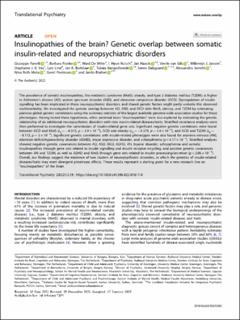| dc.description.abstract | The prevalence of somatic insulinopathies, like metabolic syndrome (MetS), obesity, and type 2 diabetes mellitus (T2DM), is higher in Alzheimer’s disease (AD), autism spectrum disorder (ASD), and obsessive-compulsive disorder (OCD). Dysregulation of insulin signalling has been implicated in these neuropsychiatric disorders, and shared genetic factors might partly underlie this observed multimorbidity. We investigated the genetic overlap between AD, ASD, and OCD with MetS, obesity, and T2DM by estimating pairwise global genetic correlations using the summary statistics of the largest available genome-wide association studies for these phenotypes. Having tested these hypotheses, other potential brain “insulinopathies” were also explored by estimating the genetic relationship of six additional neuropsychiatric disorders with nine insulin-related diseases/traits. Stratified covariance analyses were then performed to investigate the contribution of insulin-related gene sets. Significant negative genetic correlations were found between OCD and MetS (rg = −0.315, p = 3.9 × 10−8), OCD and obesity (rg = −0.379, p = 3.4 × 10−5), and OCD and T2DM (rg = −0.172, p = 3 × 10−4). Significant genetic correlations with insulin-related phenotypes were also found for anorexia nervosa (AN), attention-deficit/hyperactivity disorder (ADHD), major depressive disorder, and schizophrenia (p < 6.17 × 10−4). Stratified analyses showed negative genetic covariances between AD, ASD, OCD, ADHD, AN, bipolar disorder, schizophrenia and somatic insulinopathies through gene sets related to insulin signalling and insulin receptor recycling, and positive genetic covariances between AN and T2DM, as well as ADHD and MetS through gene sets related to insulin processing/secretion (p < 2.06 × 10−4). Overall, our findings suggest the existence of two clusters of neuropsychiatric disorders, in which the genetics of insulin-related diseases/traits may exert divergent pleiotropic effects. These results represent a starting point for a new research line on “insulinopathies” of the brain. | en_US |

